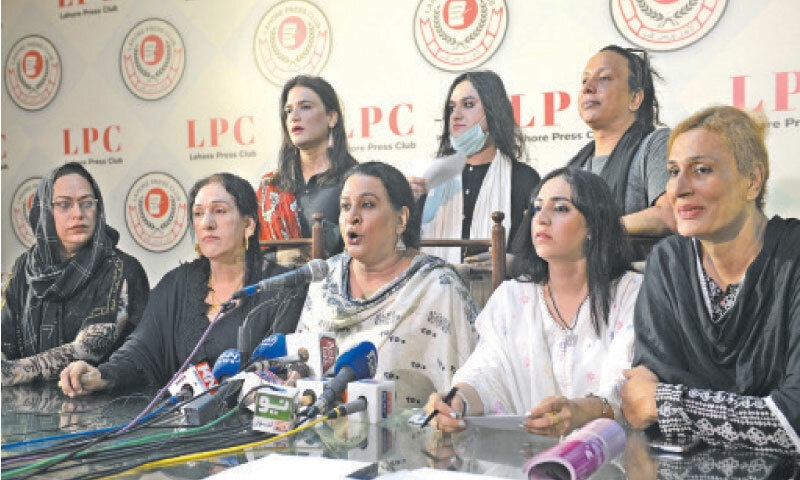LAHORE: Transgender rights activists on Friday condemned and denounced propaganda around the law that ensures protection of their basic rights, and hate campaign against the community that they say has put their lives in danger. They also urged people, including the religious community, to read the law for a better understanding.
Addressing a press conference at the Lahore Press Club along with other community fellows, Jannat Ali, a trans community activist and a university lecturer, said now that the elections are close, the religious parties have decided to use a persecuted community as a commodity to prove themselves as more Muslims. This campaign, she said, has endangered their lives.
Commenting on the view that the Transgender Persons (Protection of Rights) Act 2018 allowed the community members to get married, Jannat said they had been asked by religious leaders in 2016 to get married and they had refused outright saying it could prove dangerous for them.
About proposals to set up medical boards to determine the gender of a transperson seeking an identity card, she questioned how many men and women had to prove their genders while getting the documents. “Islam teaches modesty, so why is our modesty being questioned? We have already gone through a lot of pain. It would have been beneficial had our religious leaders invited us for talks. This law is specifically for transgender persons, not a free pass for men and women to get their genders changed. We condemn this campaign vociferously.”
She also claimed the recent controversy had affected her job and her contract wasn’t renewed. “There is an effort to eliminate our community because they see doctors, engineers and lecturers in us. There was a time when we could get seats in parliament, but they don’t want to see transgenders empowered.”
Another activist, Laila Naz, recounted the struggles of the community. “If this law was a ray of hope for us after 75 years, why do you want to snatch it from us? What is it about us that they don’t tolerate? Why are we being attacked and harassed? The religious community should talk to us, consult us and not humiliate us publicly.”
Senior activist Neeli Rana said the recent campaign had taken the community a century back when the criminal tribes law was enacted against them by the British. She also questioned the logic for medical tests for the community when men and women didn’t have to go through the process.
Sonia Naz urged people not to upload or believe fake news about them seeking the right to marriage, as it was resulting in attacks and harassment against them. “Anyone with an ‘X’ ID card can’t marry as per the Constitution and Sharia. We are already a marginalized and vulnerable class, there’s already a lot of violence and harassment against us, the fake news impacts our lives further. We are not just educated from college/universities, but have received Islamic education also, so we know what Islam allows and doesn’t. We only want to live with respect,” she pleaded.
Zanaya Chaudhry, another rights activist, told the media the transgender community was given all the rights as men and women, expect the right to marry. This isn’t mentioned anywhere in the law. Addressing reports of being associated with homosexuals, she said the LGBTQ community didn’t need a separate identity card and was very comfortable with its identity; it had nothing to do with transgender people. “As per Nadra policy, if a man or woman wants to get their gender changed they have to petition the high court. Trans people can get it changed within their family tree or under the name of their guru,” she explained.
Human Rights Commission of Pakistan Chairperson Hina Jilani extended support to the community on behalf of the civil society and human rights organizations. She denounced how transgender persons’ right to life was being violated, its safety not ensured, and every basic right under the Constitution denied to its members.
“The Supreme Court had in 2012 ordered the federal government to ensure the community was provided constitutional protection as was the case for every citizen. Before enacting it, each clause of the law was studied. The community wants to uplift itself economically and socially, and break stereotypes around it. There is no logic behind the objections to the law. The court should seek a wider perspective, listen to the community’s opinions and not just of legal experts and religious scholars,” she suggested.
Published in Dawn, October 2nd, 2022













































